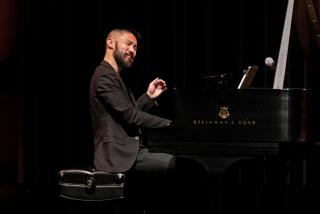MUSIC REVIEW : Pianist Radu Lupu: A Style All His Own
- Share via
Many joys, many beauties, many nuances arose again at Radu Lupu’s latest Southern California performance. The Romanian pianist, a longtime visitor here, remains a major presence on the international circuit. At 49, he continues to play like a master; he deserves his acclaim.
Yet, it is possible to admire Lupu’s virtues and accomplishment--this time around in a handsomely balanced program exposing Bartok, Schumann and Schubert--without wishing that all his colleagues and peers the world around would emulate his approach to making music or to playing the piano. What he does works for him, but may not be duplicable.
Lupu’s well-known retreats into inwardness--what some have come to call, using, perhaps pretentiously, the German noun Innigkeit-- compose his pianistic signature. Sometimes he makes music in the manner of an extrovert; more often, he does the opposite. At length.
The results can put a great distance between pianist and listener, a distance seldom bridged. One remembers Lupu performances at which this happened, when near-inaudibility and the musical equivalent of mumbling dominated the aural horizon, hampering any shared communication.
Sunday night in the Dorothy Chandler Pavilion--on the L.A. Philharmonic’s Celebrity Recital series--Lupu complemented his ubiquitous bouts of quiet self-regarding with occasional directness, moments when the strong rhetoric in, say, Schumann’s “Davidsbundlertanze,” or in the four Impromptus of Schubert’s Opus 142 actually spoke, unmuted, to his audience. These moments became cherishable and memorable.
In the Bartok groups that opened each half of the program, the Suite, Opus 14, and the Improvisations on Hungarian Peasant Songs, Opus 20, the pianist’s penchant for dynamic understatement often seemed appropriate to the musical materials. Visually, Lupu gets out of the way of the music he makes; in the sound, however, one often hears great affection.
Such affection was palpable in the first encore, the slow movement from Schubert’s Sonata in A, Opus 120.
More to Read
The biggest entertainment stories
Get our big stories about Hollywood, film, television, music, arts, culture and more right in your inbox as soon as they publish.
You may occasionally receive promotional content from the Los Angeles Times.










